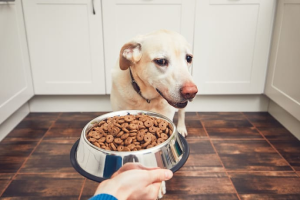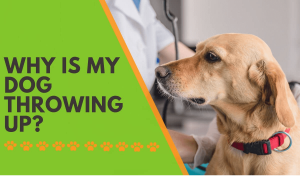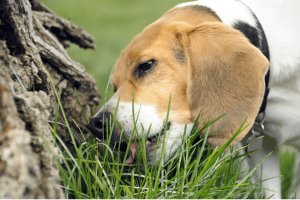Sometimes it happens that a dog refuses to eat dog food. There might be plenty of reasons for that, starting with the upset tummy or the mood swings and finishing with some serious issues like stomach diseases or even cancer.
We won’t be running ahead of ourselves and be making a diagnosis without knowing the whole picture. And that’s exactly what we recommend you to do. First of all, read this article and then make up a plan of further actions. Perhaps, you will end up giving GNC dog vitamins to bring things back to the norm. Or maybe you’ll have to visit your vet and only then will get an idea of what is going on with your furry friend and how you can fix that.
My Dog Refuses to Eat - Why?

Oh, if only dogs could talk, they would share their feelings and tell you where it hurts. But the reality is that they couldn’t, so here are the most common reasons why your dog stopped eating.
Illness
There might be some other reasons for the ‘my dog not eating’ problem. That could be the result of sickness, especially when there are some other symptoms. A decline in appetite can stem from:
- liver disease
- kidney issue
- diabetes (especially when the dog not eating but drinking water)
- fever
- infection
- stomach pain, and some more.
Your canine might be unwilling to eat due to cancer as well. If you have doubts that your pooch might suffer from any disease and link the lack of appetite to it, you’d better go to the vet and start with a thorough examination.
Medications
If your dog hasn't eaten in 2 days after taking a new medication course, there’s a chance that the drugs or vaccination is the cause of the eating problem. Even though it sounds odd, some medications can make your pet sick. In this case, you should consult with your veterinarian and ask for the pill replacement if it’s possible.
Owner Absence
Some dogs are destructive when left alone. Others live through their separation anxiety by refusing to eat. If the beloved dog owner is away for a long time, this might lead to anorexia in dogs. Even a minor change in the routine can lead to eating disorders. But when a favorite person gets out of sight, the canine might be stressed out.
Dental Disease
Is your dog refusing to eat due to toothache, decay, gingivitis, or any other dental issue? If there’s any chance you can check inside your dog’s mouth, do it. Perhaps, you’ll notice a broken tooth or infected gums. And when one of the chewing tools gets out of order, you are not in the mood to eat, are you?
Food Preferences
“My dog won't eat this!” - does this ring any bells? If your picky eater doesn’t like the salmon flavor, how do you expect a dog to eat the food they hate? It’s obvious, you won’t make your canine eat what they don’t want to. Besides, if your pooch turns away their nose from the freshly opened bag of their favorite kibble, don’t rush into blaming your pet. Perhaps, the company has made changes in the formula, and your dog doesn’t approve of them.
Stress or Anxiety
Have you moved to a new place? Are there any changes in the dog’s routine? Do you spend as much time with your furry friend as you used to? Or are you bringing a brand new bundle of joy to your place, and the puppy doesn't want to eat? All these things might put your pet under stress, which can lead to dog loss of appetite.
Overfeeding
There might be a simple excuse for your pooch to refuse to eat everything you put in their bowl. You canine might not be hungry because there was too much food during the previous intake. Dogs can't eat more than their stomachs can hold. In this case, just let your pet’s tummy digest everything they have recently gulped in.
Spoiled Food
Do you always check the wet puppy food label before feeding your pet? If you don’t, your puppy is not eating because the food is expired. Or, the opened food might be stored improperly, which might change the properties of the meal.
Tips on How to Get a Dog to Eat

The course of action on how to get a dog to eat will depend on what you and your vet find to be the reason for the problem. If no serious health issues are detected, we would recommend considering these tips.
- Try a different flavor, recipe, or even a dog food brand to check if anything appeals to your pet’s appetite better.
- Go for an age-specific recipe like senior dog food for a sensitive stomach.
- Mix kibble with human food or a delicious topper.
- Warm up wet food in the microwave oven or add several tablespoons of warm water to kibble.
- Establish a mealtime schedule - divide dog’s food into two or three servings and give them to your dog at a consistent time.
- Exercise your dog well before the meal.
- Cut back on treats or snacks not to spoil a dog's appetite.
But as your dog is prescribed a special diet (which might taste different from what the canine got used to) due to health issues, these tips might not work. How to stimulate a dog's appetite if they are on a prescription diet then? We do not recommend starving your pet to get them to eat what they should. The best thing you can do is to talk with your vet about the possible alternatives.
FAQs
There might be plenty of reasons for your dog to refuse to eat. Perhaps, they are stressed out or ill. New food that you introduce might not be that appealing for your pooch or the company made changes in the recipe that are spotted by your pet’s taste buds.
How to force feed a dog who seems to have no health issues? Increase an activity level, try another recipe or flavor, mix dog food with some human food or topper, and so on.
It depends on the dog, but usually, a canine can do without food from three to five days.
You can start with shredded chicken, which is easy on the dog’s stomach, if your dog has no chicken allergy, of course. A can of the new delicious wet recipe might also work.
Related articles



What else do you want to learn?








